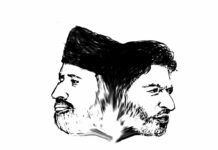Basharat Ali
On July 13, the Martyrs Day, all pro-freedom groups have called for a united strategy. Whether this ‘unity call’ is a consequence of killings in Sopore or not-so-startling revelations made by former R&AW chief AS Dulat in his book or both are mere speculations. However, these speculations cannot be put aside so easily and warrant the needed transparency in the camp.
The first impediment to effectively engage with the population and lose their confidence starts from the collective failure of being transparent and truthful to them.
In the last decade or so, the inability of Hurriyat to contain and check the internal wranglings have made their policies and strategies self-defeating; in which each group got localised in terms of its reach to ‘pockets’, divided people, pitting sympathisers of one faction against the other.
As long as there is confusion as to which group truly represents the aspirations of people in Kashmir, the Indian state is happy. This confusion allows them to easily manipulate people using propaganda to discredit one group and machinations of all sorts to try enter into secret deliberations with the other.
Over the past few years concerted efforts have been made to make Hurriyat entirely irrelevant as a political player. With its cadres put behind bars, middle-rung leaders booked under Public Safety Act and the top leadership placed frequently under house arrest, the Indian state has barely allowed the pro-freedom camp take any fresh air and the successive client regimes created a facade of ‘negotiation’ and ‘battle of ideas’ as their means to engage with Hurriyat.
Hurriyat has taken up the task of convincing a Nuclear Powered State of Kashmir’s right to be free with peaceful means to bring down the symbols of the Indian State from Jammu and Kashmir. This uneven equation is sure to throw up results which points out to success of a more powerful player, because its structure has the ways and means of appropriation, and in the process highlight the failures and fissures of the less powerful, because the former don’t possess similar institutional system to conduct their politics on many fronts.
There is another way of looking at these results, though. The powerless group of people led by an octogenarian man uses the language of tried and tested means, like boycott of elections, protests and shutdowns. The supposed largest democracy of the world—besides its counter-insurgency mechanisms which have killed hundreds of thousands—uses means like corruption and political double-speak to delegitimize a peoples’ movement and attempts to co-opt leaders through intimidation and prolonged incarceration. A comparison at such basic and structural level reveals the failures of a State which claims to growing bigger than the Big Brother.
That the people of Kashmir continue to rally behind Hurriyat, heed their Hartal and Chalo calls, signifies another larger failure of Indian state to break the collective will of the population. These failures have not been capitalised to its optimum by the pro-freedom groups who are stuck in old fashion moral politics where ‘end’ is in focus more than the ‘means’.
With the rise in locally motivated insurgency recently, with teenagers surprising the Indian security architecture and think-tanks, a united Hurriyat needs to find some concurrence with old objectives outlined in a new fashion by the boys fighting it out in the jungles and streets of Kashmir. The new political strategy of the freedom movement should be informed and influenced by the new militant strategy. A failure to make the best of advances made by one arm of resistance by another would lead the movement to nowhere.
(Basharat Ali is graduate in peace and conflict management from Jamia Milia Islamia’s Nelson Mandela Peace and Conflict Studies Centre)















